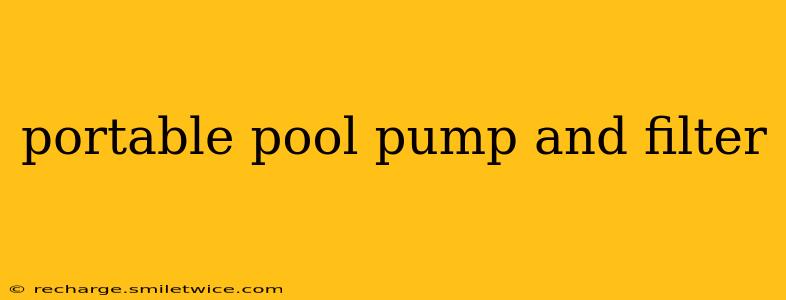Maintaining sparkling clean water in your portable pool is crucial for a refreshing and safe swimming experience. A portable pool pump and filter system is essential for this task, ensuring your pool stays hygienic and enjoyable throughout the summer. This guide will delve into the world of portable pool pumps and filters, addressing common questions and helping you choose the right system for your needs.
What Size Portable Pool Pump Do I Need?
Determining the correct pump size depends entirely on the volume of your pool. Manufacturers often provide flow rate information (gallons per hour or GPH) for their pumps, which should match or exceed your pool's capacity. Smaller pools, typically those under 1,000 gallons, will require a less powerful pump, while larger pools necessitate a more robust system. Check your pool's manual or use an online calculator to estimate the volume if you're unsure. Overpowering a small pool is unnecessary and can be detrimental, while underpowering a large pool will lead to inadequate filtration.
How Often Should I Run My Portable Pool Pump?
The ideal runtime for your portable pool pump depends on several factors including pool size, water temperature, and the number of users. However, a general guideline is to run the pump for at least 8 hours per day, ideally 12 hours for larger pools or those with heavy use. This ensures adequate circulation and filtration, effectively removing debris and keeping the water clean and clear. Hotter weather may require longer run times due to increased algae growth. Regular cleaning of the filter cartridge is also vital; a clogged filter reduces pump efficiency and compromises water quality.
How Do I Clean the Filter on My Portable Pool Pump?
Cleaning your portable pool pump's filter is a crucial part of maintaining your pool's water quality. The frequency depends on usage, but generally, you should clean it every 1-2 weeks during peak use. Most filters are cartridge-based and can be easily removed and cleaned. First, always turn off the pump and disconnect it from the power supply. Then, remove the filter cartridge and rinse it thoroughly with a garden hose until the water runs clear. Avoid using harsh chemicals or high-pressure water jets, as this could damage the filter. Allow the filter to dry completely before reinstalling it. For significantly soiled filters, you might need a filter cleaner to remove stubborn debris.
What are the Different Types of Portable Pool Pumps?
Portable pool pumps come in various types, primarily differing in their filtering mechanisms. Sand filters offer a more robust filtering solution, requiring less frequent cleaning than cartridge filters. Cartridge filters are generally more affordable and easier to maintain. Some pumps also incorporate UV-C sterilization to enhance water clarity and kill harmful bacteria. The choice depends on your budget, maintenance preferences, and the level of cleanliness desired.
Can I Use a Regular Pool Pump for a Portable Pool?
While technically possible in some cases, using a standard in-ground pool pump for a portable pool is generally not recommended. In-ground pool pumps are often much larger and more powerful than necessary for smaller portable pools and may even damage the thinner walls of inflatable or above-ground pools. Portable pool pumps are specifically designed for smaller volumes and have the correct power and flow rate for optimal performance and safety.
How Do I Choose the Right GPH for My Portable Pool?
The GPH (gallons per hour) rating of your pump should be carefully considered based on the pool's capacity. A good rule of thumb is to choose a pump that circulates the entire pool's volume at least once every 4-6 hours. However, consult the pool manufacturer’s recommendations and consider factors like water temperature and usage levels for optimal performance. An underpowered pump may struggle to filter adequately, leading to cloudy water, while an overpowered pump might be unnecessary and wasteful.
How Long Does a Portable Pool Pump Last?
The lifespan of a portable pool pump depends on several factors, including usage frequency, water quality, and proper maintenance. With regular cleaning and care, a good quality pump can last for several seasons, even up to 5 years or more. Neglecting maintenance can significantly shorten its lifespan. Early signs of failure may include decreased flow rate, unusual noises, or leaks. If you notice any of these issues, it's recommended to inspect the pump thoroughly or contact a professional for assistance.
By carefully considering these factors and choosing the right portable pool pump and filter, you can ensure your portable pool remains a source of refreshing enjoyment throughout the summer months. Remember, regular maintenance is key to keeping your water clean, clear, and safe for everyone to enjoy.
